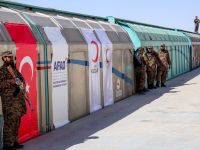The Security Council agreed on Tuesday to extend the UN's ballooning Iraq oil-for-food program for six months and to streamline its vetting procedures to speed up delivery of supplies.
It also agreed in principle to release up to 600 million Euros of Iraq's oil income in cash from the tightly controlled UN account, to train and pay maintenance workers in Iraq's dilapidated oil industry.
But diplomats said this would happen only if there were safeguards that none of the money would reach the Baghdad government.
A senior Arab diplomat said the council had given Iraq no incentive to resume its oil exports, which it suspended five days ago in a disagreement with the United Nations over the pricing formula for December.
"There is no link between this resolution and the price," said the ambassador after the 15 council members voted unanimously to extend the four-year-old program for a ninth 180-day phase.
The current phase was due to expire at midnight (0500 GMT Wednesday).
The program was set up to enable Iraq to buy food and medicine that were otherwise banned under the UN's Gulf War sanctions.
But -- with rising oil prices and the raising, then the removal, of the council's ceiling on Iraq's crude oil exports -- it has grown into a 20-billion-dollar-a-year exercise covering a wide range of sectors.
The council agreed to increase by five percent to 58 percent the proportion of revenue available for humanitarian imports into the central and southern parts of Iraq under government control.
It stipulated that these should be used for "strictly humanitarian projects to address the needs of the most vulnerable groups in Iraq."
It formalized an earlier decision to reduce from 30 to 25 percent the proportion, which goes into a compensation fund for victims of the Iraqi invasion of Kuwait in August 1990.
The other divisions of the revenue -- 13 percent for the three Kurdish provinces in northern Iraq where the UN administers the program, and four percent for various UN administrative costs -- are unchanged.
The council voted to add electrical goods and housing supplies to the "fast-track" categories, where import contracts can be approved without being vetted by the sanctions committee.
It postponed a decision on fast-tracking contracts in the transport and telecommunications sectors, although UN Secretary General Kofi Annan said in a report last week that the lack of trucks and port equipment in Iraq was hampering deliveries of supplies.
Presenting Annan's report to the council on Monday, program director Benon Sevan said that unless some revenues were available as a "cash component" to buy local produce, "we will soon face serious difficulties."
The council resolution asked Annan "to make the necessary arrangements" to release an unspecified amount to buy local produce, and up to 600 million Euros to help rehabilitate the Iraqi oil industry.
Iraq has in the past refused to allow its oil revenues to be handled by UN relief agencies or non-governmental agencies.
Speaking before the vote, the British ambassador to the UN, Jeremy Greenstock, said "the cash component could make a significant contribution ... by allowing the local economy to be revived."
The deputy US ambassador, James Cunningham, noted that the arrangements Annan was asked to make would be "subject to the approval of the council".
He added: "We would view submissions of arrangements for the oil industry only as incomplete."
Council members rejected a proposal to release funds unconditionally from the escrow account to pay the 11 million dollars Iraq owes the UN in unpaid contributions.
They also dropped wording from the draft resolution which asked Annan to prepare a report on ways of stopping smuggling across Iraq's borders – UNITED NATIONS (AFP)
© 2000 Al Bawaba (www.albawaba.com)







